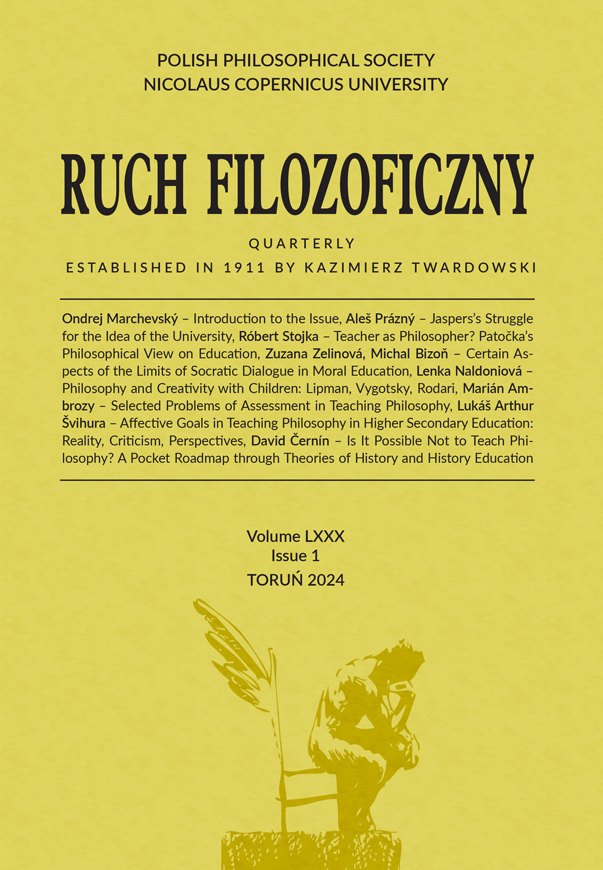Philosophy and Creativity with Children: Lipman, Vygotsky, Rodari
DOI:
https://doi.org/10.12775/RF.2024.05Słowa kluczowe
philosophy for children, creativity, imagination, Mathew Lipman, Lev Vygotsky, Gianni RodariAbstrakt
The article is focused on the topic of how to practice philosophy and support creativity in kindergartens and elementary schools with the help of fairy tales, in particular with the help of the story of Pinocchio. Emphasis is placed on Lipman's activity of philosophy for children, which he tried to connect with Vygotsky's theories. The aim of the article is to show the importance of developing critical thinking in the form of dialogue in connection with creative thinking, which Gianni Rodari focused on. Rodari was based on Vygotsky's theory of imagination as a process of the human mind, which is a characteristic of all human beings.
Bibliografia
Baum L. Frank. 2020. Čaroděj ze země Oz. Praha: Dobrovský.
Collodi Carlo. 2013. Pinocchiova dobrodružství. Praha: Albatros.
Collodi Carlo. 1892. The Story of a Puppet or the Adventures of Pinocchio. London: The Fisher Unwin.
Depalma Anthony. “Giving Soviets a Lesson in Thinking“. New York Times, 30. 01. 1991. Access 8. 05. 2023. https://www.nytimes.com/1991/01/30/education/giving-soviets-a-lesson-in-thinking.html
Lewis Lizzy, Chandley Nick. 2012. Philosophy for Children Through the Secondary Curriculum. London: Continuum.
Liessmann Konrad Paul. 2008. Teorie nevzdělanosti: omyly společnosti vědění. Praha: Academia.
Lindgrenová Astrid. 1985. Pipi Dlouhá punčocha. Praha: Albatros.
Lipman Matthew. 1996. Natasha: Vygotskian dialogues. New York and London: Teachers College, Columbia University.
Lipman Matthew. 2003. Thinking in Education. New York: Cambridge University Press.
Matějčková Tereza. “Pinocchio se vrací. Proč má i naše srdce zdřevnatět”. Host, 5. 2023. Access 8. 6. 2023. https://casopishost.cz/clanky/11191-proc-ma-i-nase-srdce-zdrevnatet
Morin Edgar. 2000. La testa ben fatta. Riforma dell’insegnamento e riforma del pensiero. Milano: Raffaello Cortina Editore.
Naldoniová Lenka. 2016. „Kreativní fantazie Gianni Rodariho”. In: Na rozhraní světů: fantastická literatura v mezioborovém zkoumání, ed. Tereza Dědinová, 221–232. Brno: Muni Press.
Naldoniová Lenka. 2017. “Dzhani Rodari i detskaia kreativnost‘ v Sovetskom Soiuze” [“Gianni Rodari and Children’s Creativity in the Soviet Union”]. Studia Culturae 31: 127–133.
Naldoniová Lenka. 2018. „Spinoza a Vygotskij v kontextu sovětské filosofie a psychologie”. In: Naturalizace filosofie v minulosti a současnosti, ed. Oldřich Kramoliš, 37–58. Ostrava: Ostravská univerzita.
Nussbaum Martha C. 2010. Not for Profit: Why Democracy Needs the Humanities. Princeton N. J.: Princeton University Press.
Rodari Gianni. 1996. The Grammar of Fantasy: An Introduction to the Art of Inventing Stories. New York: Teachers & Writers Collaborative.
Rodari Gianni. 2002. Mago Girò. Roma: Editori Riuniti.
Rodari Gianni. 2008. “Vychytralý Pinocchio”. In: Pohádky na hraní, 14-19. Praha: Knižní klub.
Sharp Ann Margaret, Reed Ronald F. 1991. Studies in philosophy for children: Harry Stottlemeier’s Discovery. Philadelphia: Temple University Press.
Spitzer Manfred. 2014. Digitální demence. Brno: Host.
Vygotskij Lev Semionovitch. 1935. Umstvennoe razvitie detei v protsesse obutchenia. Sbornik statei. Moskva, Leningrad: Gosudarstvennoe utchebno-pedagogitcheskoe izdatelstvo.
Vygotskij Lev Semjonovič. 2004. Psychologie myšlení a řeči. Praha: Portál.
Vygotsky Lev Semenovich. 1987. „Thinking and Speech“. In: The Collected Works of L. S. Vygotsky. Volume 1. Problems of General Psychology, ed. Robert W. Rieber, Aaron S. Carton, 39-285. New York: Plenum Press.
Vygotsky Lev Semenovich. 1997. The Collected Works of L. S. Vygotsky. Volume 4. The History of the Development of Higher Mental Functions. Ed. Robert W. Rieber. New York: Springer Science & Business Media.
Wittgenstein Ludwig. 1922. Tractatus Logico-Philosophicus. London: Kegan Paul, Trench Trubner & Co. LTD.
Pobrania
Opublikowane
Jak cytować
Numer
Dział
Licencja
Prawa autorskie (c) 2023 Lenka Naldoniová

Utwór dostępny jest na licencji Creative Commons Uznanie autorstwa – Bez utworów zależnych 4.0 Międzynarodowe.
Statystyki
Liczba wyświetleń i pobrań: 1031
Liczba cytowań: 0



